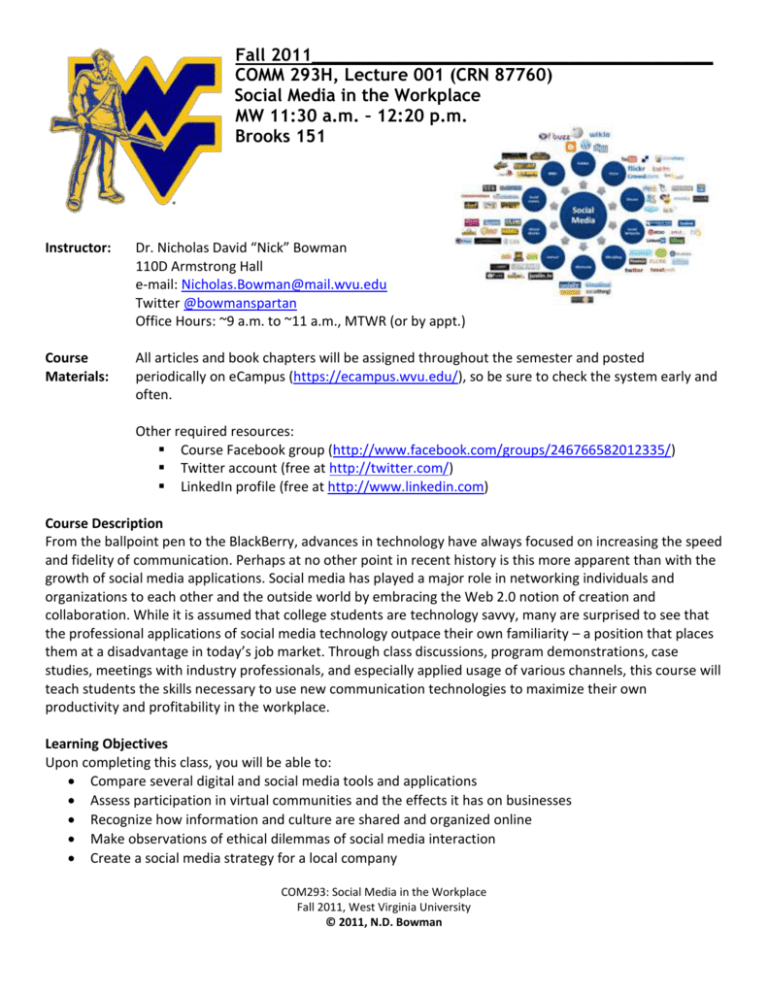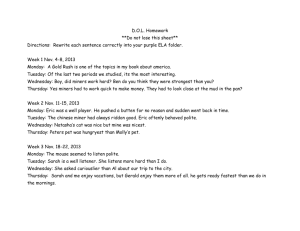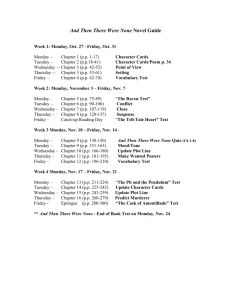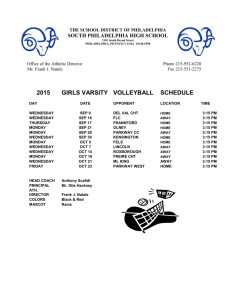Honor's Seminar: Social Media in the Workplace
advertisement

Fall 2011_______________________________________ COMM 293H, Lecture 001 (CRN 87760) Social Media in the Workplace MW 11:30 a.m. – 12:20 p.m. Brooks 151 Instructor: Dr. Nicholas David “Nick” Bowman 110D Armstrong Hall e-mail: Nicholas.Bowman@mail.wvu.edu Twitter @bowmanspartan Office Hours: ~9 a.m. to ~11 a.m., MTWR (or by appt.) Course Materials: All articles and book chapters will be assigned throughout the semester and posted periodically on eCampus (https://ecampus.wvu.edu/), so be sure to check the system early and often. Other required resources: Course Facebook group (http://www.facebook.com/groups/246766582012335/) Twitter account (free at http://twitter.com/) LinkedIn profile (free at http://www.linkedin.com) Course Description From the ballpoint pen to the BlackBerry, advances in technology have always focused on increasing the speed and fidelity of communication. Perhaps at no other point in recent history is this more apparent than with the growth of social media applications. Social media has played a major role in networking individuals and organizations to each other and the outside world by embracing the Web 2.0 notion of creation and collaboration. While it is assumed that college students are technology savvy, many are surprised to see that the professional applications of social media technology outpace their own familiarity – a position that places them at a disadvantage in today’s job market. Through class discussions, program demonstrations, case studies, meetings with industry professionals, and especially applied usage of various channels, this course will teach students the skills necessary to use new communication technologies to maximize their own productivity and profitability in the workplace. Learning Objectives Upon completing this class, you will be able to: Compare several digital and social media tools and applications Assess participation in virtual communities and the effects it has on businesses Recognize how information and culture are shared and organized online Make observations of ethical dilemmas of social media interaction Create a social media strategy for a local company COM293: Social Media in the Workplace Fall 2011, West Virginia University © 2011, N.D. Bowman Course Assignments Class Participation (300 points total) Attendance and Participation (100 points) – As an upper-level special topics course, our learning will be driven in large part by your presence and participation in class. Especially given the dynamic and emergent nature of social media, much of our learning will take place in discussion and practice. Moreover, merely attending class is not sufficient – you will be expected to be active and engaged in class discussion. Creating and maintaining your social presence (100 points) – It is not enough to merely create social media accounts; in order for them to be successful they much be constantly updated and edited. (Fresh) Content is king, and this content will be evaluated periodically throughout the semester. In-Class Activities/Homework (100 points) – You will be given regular assignments based on the lecture, readings, and application of topics covered in this course. You will be given instructions for each assignment at the appropriate time. Class Projects (700 points total) Discussions (200 points total) o Social media application profile (50 points) o SWOT analysis (75 points) o One-on-ones (75 points) Major portfolio projects (500 points total) o FIRST HALF: Personal Social Media Plan (250 points) – To understand social media is to understand how you already live and exist in a persistent, virtual world. To this end, we will start our class discussion exploring this presence so that students can understand (a) how they currently live online and (b) how they can strategically shape this presence. What is your social media presence? (100 points, due Sept. 7) Personal social media plan (150 points, due Oct. 5) o SECOND HALF: Corporate Social Media Plan (250 points) – Throughout the semester you will develop and begin to implement a social media strategy for a small local company. You will also be asked to analyze the initial success of this strategy. This plan will also include a written paper element. You will be presenting this project to the class as well as the small business owner. The assignment and grading rubric will be provided later in the semester. Identify corporate social media partner (50 points, due Oct. 19 to Oct. 31) Social media site map (50 points, due Nov. 14) Corporate social media rough draft (50 points, due Nov. 30) Corporate social media plan (100 points, due Dec. 14) COM293: Social Media in the Workplace Fall 2011, West Virginia University © 2011, N.D. Bowman Tentative class schedule (as of 08.04.11, also available here): Date Topic Monday, August 22 Syllabus What is social media? Wednesday, August 24 Monday, August 29 Wednesday, August 31 Monday, Sept. 5 Wednesday, Sept. 7 Monday, Sept. 12 Wednesday, Sept. 14 Who are you really/virtually? Assignment Com_Score Reports Kietzmann et al (2011) “Social media?” O’Reilly (2005) “Web 2.0” boyd (2007) “Public Appearance” boyd (2011) “Real Names” Qualman, Ch. 2 Shirkey, Ch. 1 (HCE) The Strength of Weak Ties Assignment: “What is your social media presence?” Granovetter (1973) “SoWT” Granovetter commentary on (1973) Shirkey, Ch. 3,4 (HCE) The Medium is the Massage “What is your social media presence?” DUE McLuhan (1967) “Medium is the Massage” Shirkey, Ch. 1 (CS) Assignment: Personal Social Media Plan NO CLASS Labor Day Observed Google Apps “What is your social media presence?” DUE before Midnight Group intro (10 min) (post on Google Docs, share link on Google+ class Facebook page) Google Docs Google Calendar Others? TWITTER 101 Hempel (2011) “Trouble @ Twitter” Kwak et al. (2010) “What is Twitter” Group intro (10 min) Wu et al. (n.d). “Flow of Twitter” FACEBOOK 101 Group intro (10 min) COM293: Social Media in the Workplace Fall 2011, West Virginia University © 2011, N.D. Bowman Assignment: Create a Twitter account, post one class-relevant link using #WVUCOM293 (Due EOD) Darling (2010) “Facebook and SoWT” Ellison et al (2007) “FB and social capital” Monday, Sept. 19 Wednesday, Sept. 21 Monday, Sept. 26 Wednesday, Sept. 28 Monday, Oct. 3 Wednesday, Oct. 5 Monday, Oct. 10 Wednesday, Oct. 12 Monday, Oct. 17 Wednesday, Oct. 19 Monday, Oct. 24 Wednesday, Oct. 26 Monday, Oct. 31 Wednesday, Nov. 2 Monday, Nov. 7 Wednesday, Nov. 9 LinkedIN 101 Group intro (10 min) Location-Based 101 Group intro (10 min) Foursquare Yelp Others? Social Bookmarking 101 Group intro (10 min) Mashable Reddit Others? Babauta (2007) “20 Ways to use LinkedIN” Nakao (2010) “5 Things to know about Location-Based SM” Richmond (2010) “3 Best Ways” Edelman “Likes v. Links” Hay, Ch. 7 *Buffer Day* NO CLASS Personal Social Media Plan One-on-One (to be completed EOD) Discussion Corporate Social Lauby, S. (2009) “HOW TO: SM Media Plan Strategy” Qualman, Ch. 4 Shirkey, Ch. 10 (HCE) Social Media Strategy I Four Pillars, SWOT, ACCESS Social Media Strategy II Four Pillars, SWOT, ACCESS (cont’d) Social Media Strategy III Technology Acceptance Model Group SWOT assignment discussion Group SWOTs x 2 (20 min) Group SWOTS x 2 (20 min) Personal Social Media Plan DUE Safko & Brake, Ch. 39, 40, 41 Safko & Brake, Ch. 39, 40, 41 (cont’d) Davis, 1989 “TAM” Venkatesh et al., 2003 “Unified TAM” Identify Campus or Community Partner DUE Group SWOT Group SWOT *Buffer Day* NO CLASS Meet with Campus or Community Partner Sample Social Media Strategies Hay, Ch. 1 Social Media Sitemap Assignment: Social Media Sitemap GUEST SPEAKER: Jennifer Bowman and “How Corporations F*ck Up Social Media” COM293: Social Media in the Workplace Fall 2011, West Virginia University © 2011, N.D. Bowman Monday, Nov. 14 Wednesday, Nov. 16 Monday, Nov. 21 Wednesday, Nov. 23 Monday, Nov. 28 Wednesday, Nov. 30 Monday, Dec. 5 Wednesday, Dec. 7 Wednesday, Dec. 14 Expectations for Final Assignment Social Media Sitemap DUE Assignment: Corporate Social Media Plan NO CLASS NCA New Orleans NO CLASS Thanksgiving Recess *Buffer Day* Group One-on-One Meetings Corporate Social Media Plan ROUGH DRAFT DUE Class Wrap-Up Instructor Evaluation Corporate Social Media Plan FINAL DRAFT DUE Corporate Social Media Plan POLISHED DRAFT DUE Instruction Method This class will be a blended course, employing both in-class lectures and the online learning format. In addition to face-to-face meetings, students will be asked to meet online, rather than in the classroom, at scheduled intervals throughout the semester. Attendance Policy Attendance in this course is necessary and mandatory, and absences will result in no less than a 10 point deduction from your participation grade. Exceptional circumstances will be dealt with on an individual basis. Communication Studies Mission Statement “Rooted in the social science perspective, the Department of Communication Studies is committed to preparing students to be competent communicators at theoretical and applied levels. Thus, our faculty is dedicated to developing students’ critical thinking, reasoning, and decision-making skills with the intent of empowering students to construct and deliver context-specific messages in their relational, vocational, and community endeavors.” Communication Studies Outcomes This course is in partial fulfillment of the following departmental outcomes: Understand the impact of communication on human behavior in interpersonal and/or organizational contexts. Understand and evaluate the role of media in society. Understand the role of verbal and nonverbal messages in the human communication process. Understand the influence of communication on culture (including the impact of membership within diverse groups) and culture on communication. Design and evaluate appropriate strategies for social influence. Understand the importance of ethical issues involved in various communication contexts. Understand the role of communication in conflict and conflict management. COM293: Social Media in the Workplace Fall 2011, West Virginia University © 2011, N.D. Bowman Social Justice “West Virginia University is committed to social justice. I concur with that commitment and expect to maintain a positive learning environment based upon open communication, mutual respect, and non-discrimination. Our University does not discriminate on the basis of race, sex, age, disability, veterans status, religion, sexual orientation, color or national origin. Any suggestions as to how to further such a positive and open environment in this class will be appreciated and given serious consideration.” If you are a person with a disability and anticipate needing any type of accommodation in order to participate in this class, please advise me and make appropriate arrangements with the Office of Disability Services (2936700).” Academic Integrity “The integrity of the classes offered by any academic institution solidifies the foundation of its mission and cannot be sacrificed to expediency, ignorance, or blatant fraud. Therefore, I will enforce rigorous standards of academic integrity in all aspects and assignments of this course. For the detailed policy of West Virginia University regarding the definitions of acts considered to fall under academic dishonesty and possible ensuing sanctions, please see the Student Conduct Code at http://studentlife.wvu.edu/studentconductcode.html. Should you have any questions about possibly improper research citations or references, or any other activity that may be interpreted as an attempt at academic dishonesty, please see me before the assignment is due to discuss the matter.” COM293: Social Media in the Workplace Fall 2011, West Virginia University © 2011, N.D. Bowman






